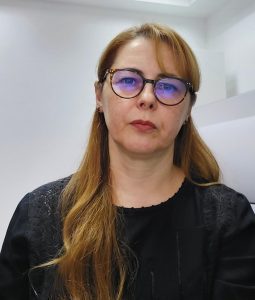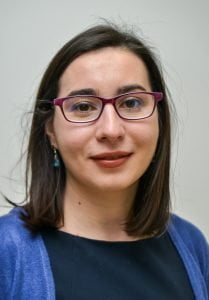Adresa: 2 Eftimie Murgu Square, 300041 Timișoara
Phone: +40256/494604
E-mail: sbarcea.laura@umft.ro
Head of the Academic Department
Members
The disciplines of Drug Analysis, Environmental and Food Chemistry (Environmental Chemistry, Hygiene, and Nutrition), are included in the program of the Faculty of Pharmacy since its establishment at the University of Medicine and Pharmacy “Victor Babeş” Timişoara, in 1991. Initially, the discipline of drug analysis was called Drug Control until 2006. Environmental and food chemistry, initially under the name Sanitary Chemistry, became, starting with the academic year 2019-2020, Environmental Chemistry, Hygiene, and nutrition factors.
Prof. Dr. Szabadai Zoltán ensured by his committed work the development of disciplines Drug analysis and Environmental chemistry, hygiene, and nutrition. He coordinated and built the course topics and laboratory training classes together with the team members; he also provided the laboratory-specific equipment for the excellent development of teaching and research and practical training of students of the Faculty of Pharmacy. This discipline comprises currently Professor Laura Sbârcea, Ph.D., Associate Professor Angela Caunii, Ph.D., Professor Lucreția Udrescu, Ph.D., and lecturer Camelia Oprean, Ph.D. From the academic year 2023-2024 the name of the discipline became Academic Department of Drug analysis and Environmental chemistry, hygiene, and nutrition.
Drug analysis is a branch of the pharmaceutical disciplines paramount for the complete professional development of the future pharmacist. It has a multidisciplinary approach and integrates the knowledge acquired in Analytical chemistry, Physical chemistry, Organic chemistry, Pharmaceutical Chemistry, Pharmaceutical Technology and applies them in the analytical control of drugs. These rationales emphasize the importance of Drug analysis as mirrored by its presence in the pharmacy license and pharmacy residency exams.
The discipline includes the course and practical training of Drug Analysis for the 5th year of the Faculty of Pharmacy – for the Romanian and French sections (semester I) – and for the 3rd year of the short-term program Pharmacy Assistance (semester I).
The main objectives of Drug analysis are the building of thinking in the methodology of drug analysis and complete control of the pharmaceutical forms; another significant purpose is acquiring practical skills required for working in a drug analysis laboratory.
The Drug Analysis course addresses the description of modern physicochemical methods of analysis and separation methods, highlighting their advantages, limitations, specificities, and applicability in managing the quality analysis of pharmaceutical preparations and expressing the analysis results.
The practical training labs of Drug Analysis are related to the course themes. They aim to acquire and apply the analysis methodology, including identifying active pharmaceutical substances and their quantitative determination in bulk and pharmaceutical dosage forms.
Dermatocosmetic Product Analysis is a discipline of the short undergraduate programme Medical Cosmetic and Cosmetic Product Technology, studied during the first semester of the third year of study. Its general objectives are understanding the concept of dermatocosmetic product quality and acquiring the main techniques of analysis of dermatocosmetic relevant substances and of corresponding pharmaceutical and cosmetic formulations, as well as acquiring practical skills to carry out this analysis. The course topics aim at familiarizing students with the concept of quality control of cosmetic products, with the legislative regulations concerning substances prohibited or restricted in cosmetic products, with the main methods of analysis used in the analytical control of cosmetic formulations as well as their applications in analysis of various constituents: preservatives, surfactants, UV filters, etc. During the practical training labs students carry out the analysis of different ingredients of cosmetic products following a given protocol. The knowledge and skills acquired by studying this discipline will find applicability in the graduates’ professional activity in analysis laboratories and in production units of cosmetic and hygiene products.
The Environmental Chemistry, Hygiene, and Nutrition course addresses the third-year students of the Faculty of Pharmacy for the programs in Romanian and French (2nd semester). The course’s objectives are presentation and analysis of the impact of environmental factors on human health, knowledge of chemical analysis methods applied to control environmental factors, knowledge of diseases caused by various inorganic and organic chemicals in drinking water in the context of long-term exposure, substances, and nutrient analysis, analysis of food spoilage processes and chemical control of spoilage, presentation of analytical methods for the detection of pesticide residues in food and information on food additives, introducing the most common food intolerances and disease, and different types of environmental pollutants methods of analysis.
The practical training laboratories introduce the methods of chemical analysis applied to control environmental factors, meaning the chemical composition of water and food.
The main objective of the discipline of Environmental and food chemistry is to train competent specialists in the pharmaceutical field, as they can meet all current requirements and quickly adapt to different jobs in the pharmaceutical and medical areas in the country and abroad.
Elements of nutrition is aimed at second-year students of the short-term bachelor’s program Pharmacy Assistant (first semester) and Medical Cosmetic and Cosmetic Product Technology (first semester). The major objective of the discipline is to inform students about the correct principles of nutrition, as formulated by health professionals, based on accumulated scientific evidence, based on biochemistry principles, avoiding strictly advertising sources.
The specific objectives are: correct information on human nutrition and its impact on the body health, respectively on the skin health, starting from the principles of a balanced diet, the role of nutrients in health, energetic, hydroelectrolytic and acid-base metabolism and reaching the diet therapy of various age groups and physiological stages. Diet therapy is also addressed in the case of pathologies that require a special diet such as cardiovascular and renal diseases, obesity, malabsorption syndromes, digestive intolerances and food allergies, diabetes, dermatological conditions.
The discipline aims for students to acquire the ability to use scientific medical concepts in the field of nutrition, beyond some preconceived ideas or myths, the ability to counsel the targeted patient, applied and honest, regarding the real effectiveness of pharmaceutical food supplements, weighed against the effectiveness balanced and active lifestyle and at the same time to actively contribute to advising consumers in order to increase the quality of life by promoting a healthy lifestyle.
Our discipline also includes the optional class of History of Pharmacy in the 1st year of the Faculty of Pharmacy and of the short-term Pharmacy Assistance program (semester I). This class presents the evolution of the pharmacy and the profession of pharmacist over the centuries. It also depicts the Romanian pharmacy from the first historical evidence of its existence to today.
Teachers of Drug analysis, Environmental Chemistry, Hygiene, and Nutrition are involved in postgraduate teaching activities for resident pharmacists in General Pharmacy and Pharmaceutical laboratory, practicing pharmacists, by offering classes within the postgraduate lectures and the master’s degree program Formulation and evaluation of the dermato-cosmetic product.
The research activity of the discipline members has the following directions: (1) development and validation of analytical methods in quality control of pharmaceutical dosage forms, (2) optimization of physicochemical and biopharmaceutical properties of pharmaceutical substances, (3) evaluation of active pharmaceutical ingredients compatibility with excipients (pro formulation studies), (4) in silico analysis of drug-drug, drug-target, drug-gene interactions with applications in drug development, (5) drug repositioning, (6) pharmaceutical data analysis in precision and systems pharmacy.





